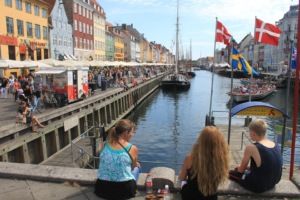Opinion
Global Denmark: The happiest country on earth – for all
Thomas Mulhern
This article is more than 6 years old.

Integration requires more than nice day out at Nyhavn (photo: Pixabay)
One hears time and time again that the Danes are one of the happiest, if not the happiest, people on Earth.
Point of discontent
Though it could easily be argued that ‘happiness’, in terms of the self-understanding that underpins the Danish mentality, would be better translated as ‘tilfredshed’ or contentedness. This is without a doubt anchored in the high level of trust that is a red thread running throughout the Danish cultural paradigm.
However, the catch 22 is that the very same societal contentedness, which is the cornerstone of Denmark´s national branding strategy, is a barrier to integration and internationalisation efforts and, thus, future economic growth here in Denmark.
A false dichotomy
Contentedness has too often helped pave the way for black and white approaches within corporate, municipal and educational communities, providing expats and Danish repats with a false dichotomy between assimilation and segregation.
The word ‘integration’ itself has been misconstrued as synonymous with assimilation, and this is hugely problematic. In addition, the tendencies of both expats and repats to remain in their comfort zones – whether it be linguistically or culturally – have helped to perpetuate these trends. As a consequence, internationlisation and integration initiatives could be much better.
For organisations, diversity management and retention have not been maximised, and nor have internationalisation projects – especially within primary and secondary education – taken priority as they have national bilingual school movements in other European countries.
Enabling change
So how does an organisation – or, on a macro level, Danish society – break out of this black and white mould and create solutions that maximise integration and internationalisation efforts?
I maintain that by creating frameworks predicated upon belonging and shared meaning for Danes, expats and repats, we can create the conditions necessary for authentic integration and, thus, a home for all stakeholders to be a part of.
Shared experiences uniting these groups promote intercultural exchanges, provide crucial networking opportunities, maintain and develop bilingual (Danish/English) communication, and allow those in the process of learning Danish to authentically participate.
If these conditions are met, we can break down the barriers to successful integration and internationalisation initiatives, enabling Denmark to become a more dynamic and competitive country.
Make it a reality
Denmark may be one of the happiest countries on earth, but it is also one of the most difficult to settle in.
It’s time for those who care about the success of this country to work together to make Denmark truly the happiest country on earth for everyone involved.

About
Thomas Mulhern
Thomas Knudsen Mulhern, the managing director of Globally Local (globallylocal.dk) and former head of the International Department at Institut Sankt Joseph, is a passionate advocate of bilingual education in Denmark. In addition, Thomas co-hosts the Global Denmark Podcast (globaldkpodcast.com)










































